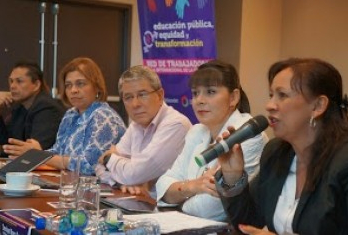On International Women’s Day this year, we celebrate women’s activism and achievements in education trade unions
In his official statement to commemorate International Women’s Day, the Education International's General Secretary, Fred van Leeuwen, proudly celebrates ‘the august history of women’s activism within trade unions’.

Van Leeuwen points out that women’s presence and participation in unions continues to fuel unions’ contributions to the economic empowerment of women, as well as to gender equality within education, in the specific case of education trade unions.
He further states that women’s structures and gender equality policies within unions have been the driving force behind such achievements. This is something that is also acknowledged by women unionists who have had a long history of participating in regional women’s networks.
His statement is available here
In a recent 10-year evaluation of the Education International (EI) Latin American Women’s Education Workers Network, network participants spoke convincingly about the important structural and educational impact the network has had in their unions, as well as in their professional and personal lives.
Making Change Happen within the Union
Roxana Rogalski explained that within her union (CTERA, Argentina), the women’s network was taken seriously and viewed as a political structure, not just as an entity that was dealing with ‘women’s work’. Indeed, the network came to be recognised as a pedagogical and political framework with a clear strategy for the achievement of rights.
As she put it:
"The EI Women’s Education Workers Network in Latin America empowers us to bring about real change within the union; there is recognition from our structures that the Network is not just a “women’s thing”, but a political structure - within a trade union and pedagogical context - that will strengthen our rights. It is supported, furthermore, by the Confederation, not only at the national level, but also within the framework of South-South cooperation with the countries of Latin America."
For another network participant, María Paula Giglio (CONADU, Argentina), one of the most important changes that she noticed in her union, and which she attributes to the activities of the women’s network, was the amendment of the collective bargaining agreement provisions on maternity leave. The period for maternity leave was lengthened and extended to men, and leave to care for elderly relatives was added to the agreement. Although these were very important victories, Giglio recognised that there is still a number of areas that the unions can work towards improving:
"One of the most important changes that I have seen in my trade union organisation was the changing of our collective agreement to give it gender perspective. Maternity leave, including adoption leave, was extended, and can be shared between fathers and mothers working for the same university. Leave to care for elderly relatives was also extended. This was the result of part of the work of the Women’s Network." "There is still a lot of work to do, dismissal for gender violence does not yet exist, and we know that in many cases the issue is hidden, for example as dismissal for psychiatric reasons." "But for us this was the first of the changes that we have seen and are still to come. This opened the door for us, together with all our women colleagues, making us more visible and raising awareness. It opened the door to approaching trade union matters from a gender perspective."
The Personal is Political
In El Salvador, Rosa Alba Calderón (ANDES) shared a moment of ‘epiphany’ that she experienced whilst participating in a capacity building workshop organised by the women’s network. She explained that only after taking part in a workshop on non-sexist pedagogy and gender equality, did she realise that she had, in fact, subconsciously been engaging in discriminatory pedagogical practices. For Calderón, involvement in the women’s network led to a personal realisation, which had wider political and professional implications:
"Before taking part in the Network’s training workshops on non-sexist teaching methods and gender equality, I myself applied teaching practices that, without my realising it, were discriminatory. By breaking away from these practices and paradigms, my educational practices became more effective and inclusive, contributing to creating social harmony and trust in the lecture hall." "In this way, the Network is helping transform education through equality and gender equity."
On a yet more personal level, Carmen Rosa Espada Avendaño (Federación de maestros urbanos de Tarabuco, Bolivia), spoke about the self-confidence and strength she gained from being a member of the network:
"The biggest change to affect me personally thanks to the work of the Latin American Women’s Education Workers Network is that I learnt to value myself much more than before, to continue to work towards my dreams, to take firm decision to achieve my goals, to feel secure in what I was doing and to know that everything is possible if we persevere."
The experiences these women unionists shared during the evaluation of the regional women’s network in Latin America are powerful testimonies to the transformative change that a serious focus on gender equality can bring, not only within unions, but also in education and in the everyday lives of women.
Source: Education International
- 439 reads
Human Rights
Fostering a More Humane World: The 28th Eurasian Economic Summi

Conscience, Hope, and Action: Keys to Global Peace and Sustainability

Ringing FOWPAL’s Peace Bell for the World:Nobel Peace Prize Laureates’ Visions and Actions

Protecting the World’s Cultural Diversity for a Sustainable Future

Puppet Show I International Friendship Day 2020

